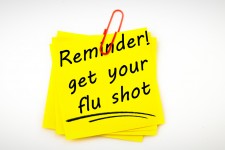
reminder for flu shot via shutterstock
It's already mid-November, so if you haven't gotten your flu shot yet, you're behind schedule; public health advocates recommend you get it by Halloween. However, it is not too late to protect yourself and your loved ones against the influenza virus.
For most healthy people, getting the flu will be the worst week of your life, but you'll recover and the following week you'll be back on your feet. But for the immunocompromised, the very young and the elderly, the flu can actually be a death sentence. It is important that we, as a society, get vaccinated to establish the high level of herd immunity that reduces the chances one of those susceptible populations coming in contact with the virus. This is what getting your flu shot is really about: Protecting those who need protecting.
It is very easy to look to the media and the internet and find criticisms of the flu shot. Some are fear mongering, like the claims that the vaccine contains dangerous mercury which it doesn't but some criticism has merit and deserve attention.
Some years, like 2014, the vaccine just did not offer much protection. The Centers for Disease Control estimate that the vaccine was only 38 percent effective. There are number of reasons this happened, but regardless, 38 percent protection is undoubtedly better than none at all afforded to those who fail to get vaccinated.
More criticism was presented last week by the Boston Globe, centering on the old theory of negative interference. The article, titled "Getting a flu shot every year? More may not be better," argued it's possible that people who get the flu shot every year to have less protection than those who get it less frequently.
So what does science make of this theory? In all honesty it is tough to really tell, mostly because we are still learning about immunity, and how and when our immune system decides to mount an attack.
In searching the literature, I found studies that compared T-cells of habitual immunizers receivers to T-cells of first time receivers, and the latter group had more activity against the influenza virus. I found others that found no decrease in efficacy of the vaccine among habitual immunizers. One theory in the literature states that when there is little drift between flu strains from year to year, protection is diminished for habitual immunizers.
From an immunology standpoint, several things maybe going on here that we just aren't quite sure of yet. In theory, this may also resemble similar concepts to what we see with allergies: Immune cells dying off because of repeated exposure to a particular antigen. More research will hopefully figure this out someday, but we know enough now to make effective vaccines. All that is left to learn is how to make them so that they're always effective.
This, however, is still not a reason to forgo getting the flu shot every year. What we know is that the flu shot is both safe and effective. How effective is still up for debate, but it is undoubtedly more effective than not getting vaccinated.
These criticisms that some have against the flu shot are warranted, and they also serve to remind public health officials and vaccine researchers that we desperately need a universal flu vaccine.


